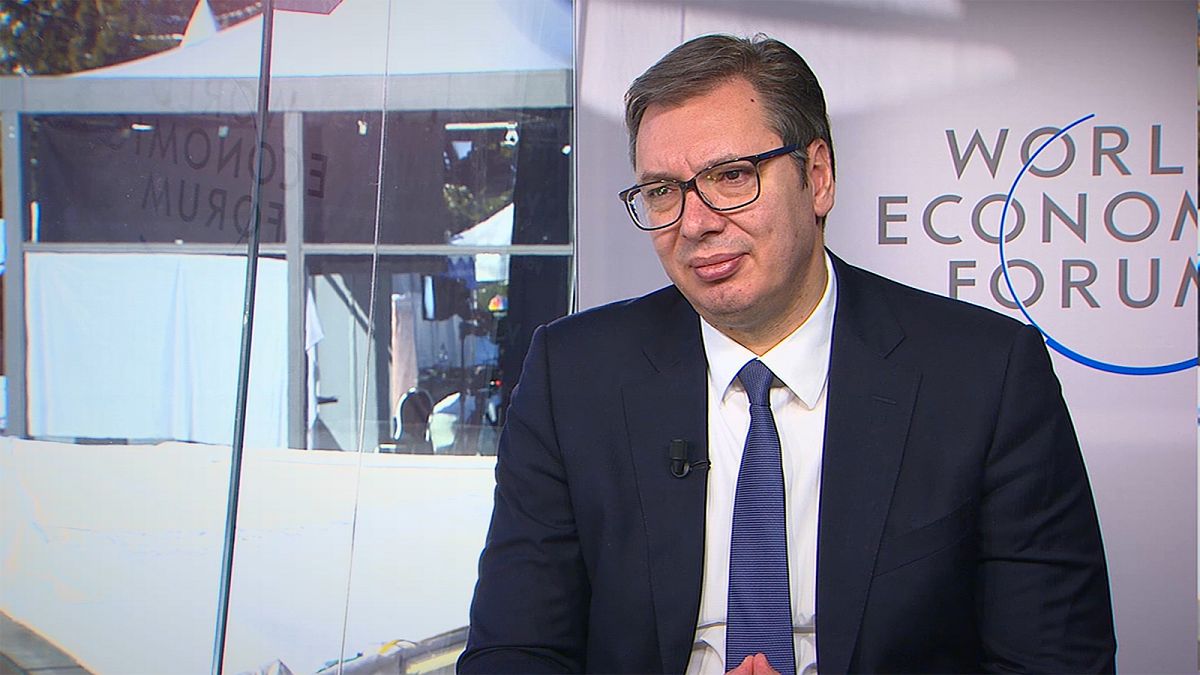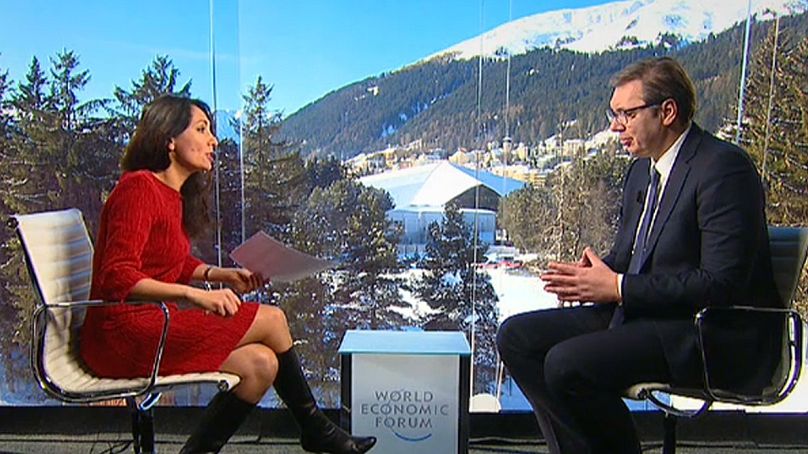In an interview at the World Economic Forum in Davos, Serbia’s President Aleksandar Vučić said joining the European Union was of the “utmost significance” for the Serbian people.
Serbia’s President Aleksandar Vučić says his government remains committed to joining the European Union, but still has no idea of a timeframe.
In an interview at the World Economic Forum in Davos, Vučić said joining the bloc was of the “utmost significance” for the Serbian people.
"We don't see the real alternative to that path ... But, you know, we have been on that path for 20 years already. I think, apart from Turkey, not a single country has been waiting so many years."
The door to the EU remains locked for Serbia with no clear prospect as to when it might be opened.
Vučić said that in discussions with European officials in Davos, no one had been able to tell him if Serbia had done enough to accede to the bloc.
“We need to wait for a decision and a conclusion from the European Union, about whether they want to see Serbia as a part of the European Union or not,” he told Euronews.
Serbia will do what's 'best for our people and for our country'
While Belgrade keeps its aspirations for EU membership alive, it's also enhancing ties with Russia.
Vučić hit out at countries that have criticised Serbia’s ties with Moscow, saying Belgrade would continue to do what is “by far the best for our people and for our country”.
"To tell you the truth, I'm fed up of being lectured and told by all the others about our co-operation with China and Russia, and then I see all the others meeting Xi Jinping and Putin even more often than I do.”
Vučić, who is facing protests over corruption and media freedom, reiterated his pledge to hold elections in April.
He dismissed threats of an opposition boycott, saying his government had worked hard to meet preconditions for free and fair elections.
In the wide-ranging interview, Vučić hailed Serbia’s economy, saying the country was undergoing strong growth.
"Speaking about the growth rate, last year 4.4 per cent, this year 4.1 per cent. We have a surplus in our budget for the fourth year in a row. And we are by far the biggest economy of the Western Balkans.”
Euronews: Back home protests have been going on for more than a year. Now you are here. That can't help but tarnish your reputation here when you do meet world leaders. So what's your message to the leaders as you are here in Davos?
Aleksandar Vučić: I have no big problems with protests. That's a democratic way of expressing political stances, political attitudes. We allowed our political opponents to organize protests for more than a year. But according to the latest polls, our numbers are up. Their numbers are very small. Just for your people (viewers) to know , it's about 53% for us and 8.5% for them.
Euronews: There will be parliamentary elections held this year?
Aleksandar Vučić: We'll have parliamentary elections by the end of April this year. It's okay. It happens all over the world and it's good to have it, because you always have a chance to face your politics with the politics of the others.
Euronews: But you won’t be able to face the politics of the others because the opposition is saying they might well boycott that poll. And so ultimately, would that not de-legitimise that vote?
Aleksandar Vučić: No, because we'll have a big turnout anyway. Much bigger than many people might expect. It's their right. Whether they are going to boycott, whether they're going to participate in elections, they can. We did our best really to meet all their demands, all demands of the European Union to deliver on it, on election conditions. Well, it's up to them.
Euronews: But what about the independent observers? And here I'm thinking of Transparency International, Freedom House, where you, your government have slipped in their ratings, where they name, as I was saying earlier, a lack of media freedom. And they say that you have been trying to grasp too much power, that you’re capitalising on your position as president, to keep a grip on power. And that's undemocratic.
Aleksandar Vučić: Of course that's undemocratic. And I'm not doing that. That's why we, to tell you the truth, did a lot in improving election preconditions, particulary on media issues, but in fact, 90% of Serbian people are using social networks. And there are no restrictions, no restraints on that. But, you know, if you define everything, if you define politics through media, that's the only important issue, you'll lose.
Euronews: But this is one of the pillars of democracy, having a free media as well as pillars of democracy and when you have outside organisations....
Aleksandar Vučić: It's one of the pillars of democracy but it's not a content of politics and the content of politics is more important.
Euronews: You are going to be meeting members of the Trump administration amid concern over rising instability in the Balkan region. What will you be telling them?
Aleksandar Vučić: I would say many things because they did together with us the establishment of a direct flight between Belgrade and Pristina. With so many things to [US National Security Adviser, Robert] O'Brien, to Richard Grenell (US envoy for Serbia) and that's what we do together.
Euronews: So that's in the agreement stage. When will those flights actually resume?
Aleksandar Vučić: It's not about resumption. But I think that it will be established in the months to come.
Euronews: Obviously, this is key to your relations with Kosovo. And if we look to the EU accession hopes, can you look to, realistically, a normalisation of relations with Kosovo, given the tension between your two territories?
Aleksandar Vučić: Serbia is not very enthusiastic, but we are still committed towards an EU path because we don't see the real alternative to that path. And that's of the utmost significance for Serbian people, for Serbian state. But, you know, we have been on that path for 20 years already. I think, apart from Turkey, not a single country has been waiting so many years.
Euronews: So why do you see that you're having to wait so long then?
Aleksandar Vučić: Some people might say that there were a lot of foreign mistakes. But I would agree with you saying that it was mainly because of the Belgrade-Pristina relationship. But at the same time, even today, I discussed that not only with European officials, but with [US Secretary of State] Mike Pompeo as well. And I've asked him: OK, even if we do that, the arrangement with Pristina, if we find the compromising solution, whether that would be enough or not to join the European Union? And none of the people from the EU or even from the US, because they were cooperating closely with each other, could confirm that we would be a part of the EU. It means that we need to wait for a decision and a conclusion from the European Union, about whether they want to see Serbia as a part of the European Union or not.
Euronews: You said that Serbs are losing their appetite for the EU. Does that apply to you as well as you've been in this holding pattern for several years?
Aleksandar Vučić: Well, if you ask me personally whether I'm jubilant about the EU relationship and everything they have recently given to my country, I can tell you I'm not jubilant, but I'm profoundly grateful to the European Union because they were very helpful when we faced terrible floods in 2014. I'm very thankful to them because they still support reforms. They supported our financial reforms, economic reforms. And to present Serbia in a bit better way, Serbia is the leader, speaking about the growth rate, last year 4.4 per cent, this year 4.1 per cent. We have a surplus in our budget for the fourth year in a row. And we are by far the biggest economy of the Western Balkans. And we are doing better and better.
Euronews: Your relations with Russia have improved. But there will come a point, won't there not, when you're actually going to have to decide whether it's going to be Moscow or the EU. You always say that you can straddle both, but EU membership does actually ask for an alignment in terms of foreign policy.
Aleksandar Vučić: You know what's your problem? The problem, and the problem with most of the Western media, is that they have a pattern. Well, you have a good relationship with Moscow. Yes, I have. And we will carry on with it. And to tell you the truth, I'm fed up of being lectured and told by all the others about our co-operation with China and Russia, and then I see all the others meeting Xi Jinping and Putin even more often than I do. You know, do your job. You are sovereign states, Serbia is a sovereign state. We do everything that is by far the best for our people and for our country.

